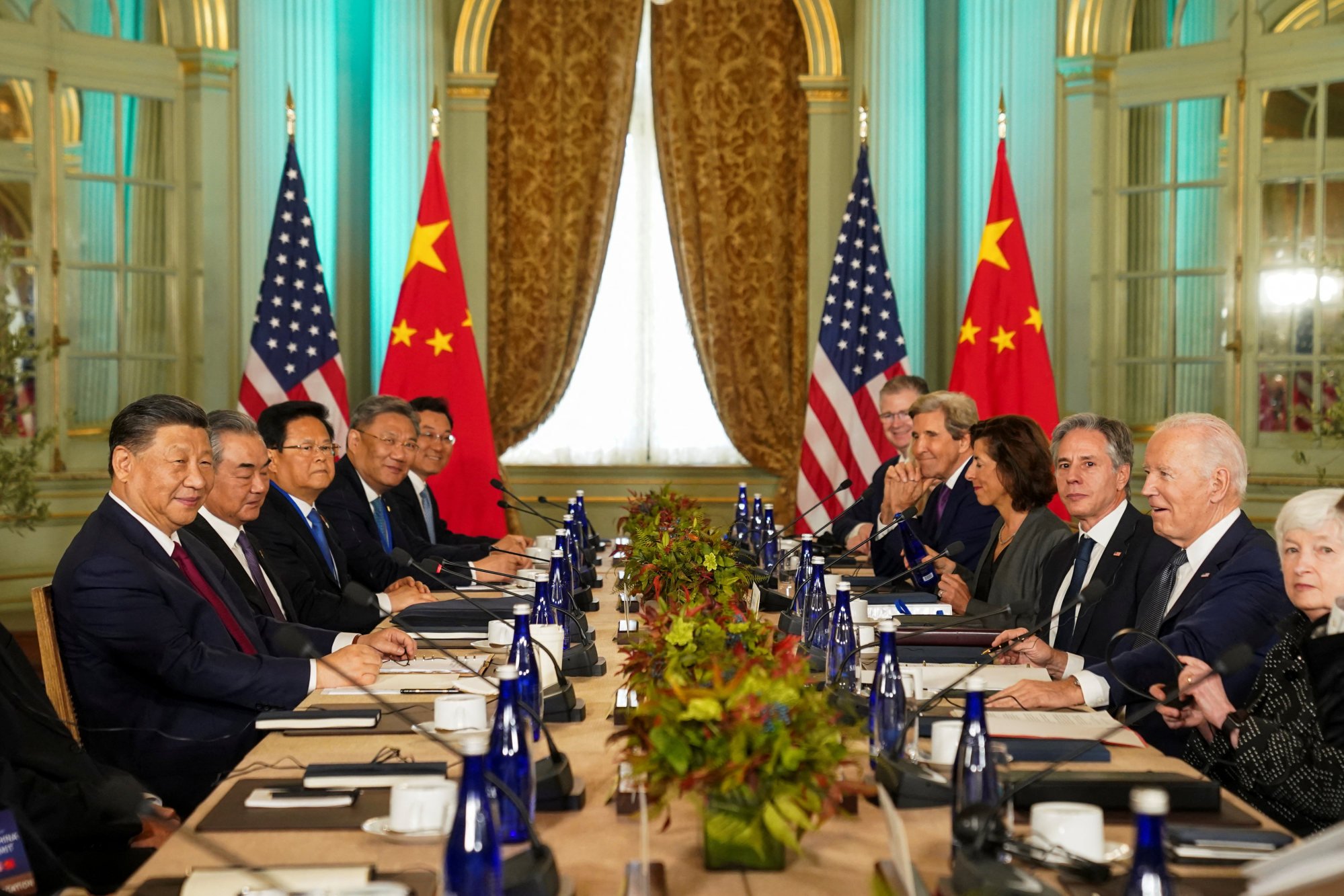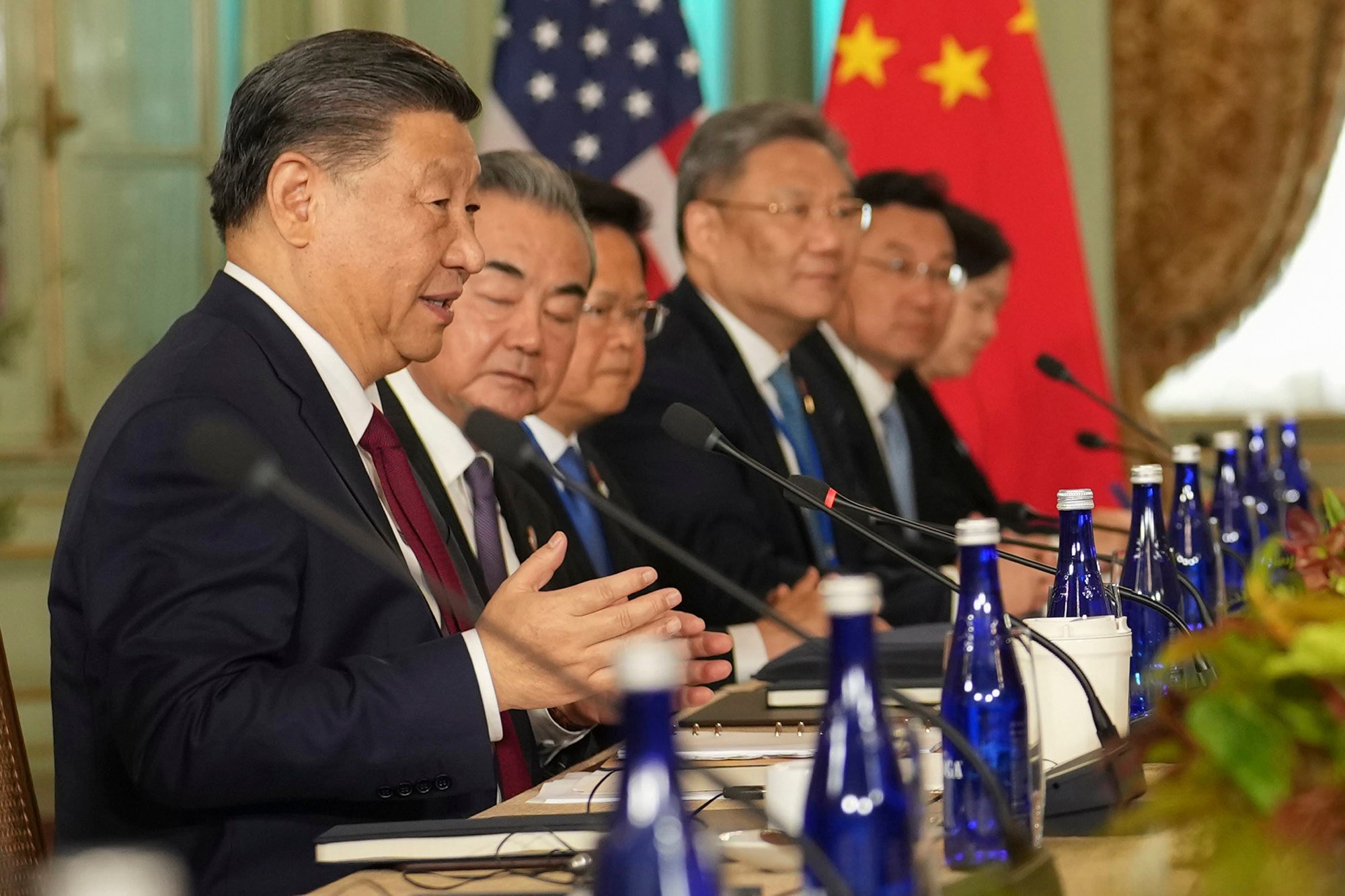Xi punctuated this in talks with Biden by calling on the US to support China’s peaceful reunification, according to the readout released by Chinese state broadcaster CCTV.
“China will eventually be reunified and will inevitably be reunified,” Xi said.
Following talks and the lunch, which included two close advisers on each side, the leaders took a walk and talked further on the grounds of the Filoli estate.
On an issue that the US pushed hard for, the two agreed to resume defence policy coordination talks, meetings under the military maritime consultative agreement, and theatre commander talks between the Pentagon and the People’s Liberation Army.
China severed the three channels – aimed at preventing an inadvertent crisis and providing tools to work it through if the worst happens – after then House speaker Nancy Pelosi visited self-governing Taiwan last August.
Biden reaffirms Taiwan stance to Xi at meeting on Apec sidelines
Biden reaffirms Taiwan stance to Xi at meeting on Apec sidelines
While much of the script in US-China summits is written in advance, the time Xi and Biden spent together was notably shorter than the three hours at their last meeting in Indonesia, particularly when translations and pleasantries are factored in.
Xi pulled up to the venue in a black sedan and was greeted by Biden. The two leaders then waved to reporters before shaking hands and entering the residence.
“I value our conversation because I think it’s paramount that you and I understand each other clearly, leader to leader, with no misconceptions or miscommunication. We have to ensure that competition does not veer into conflict,” Biden said in opening remarks as the two delegations faced each other.

“The critical global challenges we face, from climate change to counter-narcotics to artificial intelligence, demand our joint efforts,” he added.
Xi then spoke, referencing his first meeting with Biden – in China 12 years ago, when both were vice-presidents – and turning quickly to “grave” economic problems, including “protectionism”.
According to the readout, China voiced its discontent with several US policies it has found particularly onerous – part of its long-standing belief that Washington is bent on holding it back – including export controls, investment reviews, and unilateral sanctions.
These “have seriously damaged China’s legitimate interests, suppressing China’s science and technology to curb China’s high-quality development and deprive the Chinese people of their right to development”.
The Beijing readout said China has no plans to overtake or replace the United States, and the United States should not have any intention of suppressing or containing China.
“The global economy is recovering, but its momentum remains sluggish,” Xi said. “Industrial and supply chains are still under the threat of interruption and protectionism is rising. All these are grave problems.
“The China-US relationship, which is the most important bilateral relationship in the world, should be perceived and envisioned in a broad context of the accelerating global transformations unseen in a century.”
Protocol gurus for Xi-Biden meeting face logistical nightmares, other hurdles
Protocol gurus for Xi-Biden meeting face logistical nightmares, other hurdles
He added: “Conflict and confrontation has unbearable consequences for both sides. I’m still of the view that major-country competition is not the prevailing trend of current times and cannot solve the problems facing China and the United States or the world at large.”
Treasury Secretary Janet Yellen, Commerce Secretary Gina Raimondo and Secretary of State Antony Blinken travelled to the venue in Biden’s motorcade, along with national security adviser Jake Sullivan and Lael Brainard, director of the White House National Economic Council, among others.
Chinese officials attending the talks included Xi’s chief of staff, Cai Qi; China’s top diplomat, Wang Yi; the head of the country’s top economic planning agency, Zheng Shanjie; commerce minister Wang Wentao; and China’s ambassador to the US, Xie Feng.
Moves to resume military-to-military dialogue, which has been suspended for more than a year, were also anticipated, along with agreements to restrict the use of artificial intelligence in autonomous weaponry, such as drones, and in the control and deployment of nuclear warheads.

US National Security Council spokesman John Kirby said a few hours before the meeting that he expected a “productive” discussion between Biden and Xi, and characterised it as a “precursor to much more communication and dialogue between our two teams going forward”.
The two sides would touch on issues including Taiwan, China’s human rights record and economic growth, Kirby said just before the summit, adding: “It is a fact that President Xi has domestic economic challenges.”
“Clearly, one can imagine that [Xi] wants to encourage more American investment in China,” he said, referring to his plan to attend a dinner on Wednesday night with US business leaders.
The cost for a seat at the same table as Xi is as high as US$40,000, with tickets reportedly in strong demand.
On Taiwan, Kirby said Biden would reassure the mainland that there is no change to the one-China policy, that the US does not support Taiwan independence and does not want to see tensions in the Taiwan Strait devolve into conflict.
Kirby said Beijing had “lines of communication in the [Middle East] region in some ways that we don’t”.
“And, certainly we would welcome … if China was willing to be helpful in making sure that Israel can get the support that it needs to defend itself and that we can get humanitarian assistance to those in need.”
Speaking of the war Russia began by invading Ukraine in February 2022, Kirby said: “China could play a role here in helping us support Ukraine but also helping advance President [Volodymyr] Zelensky’s vision of a just peace here for when the conflict is over.”


